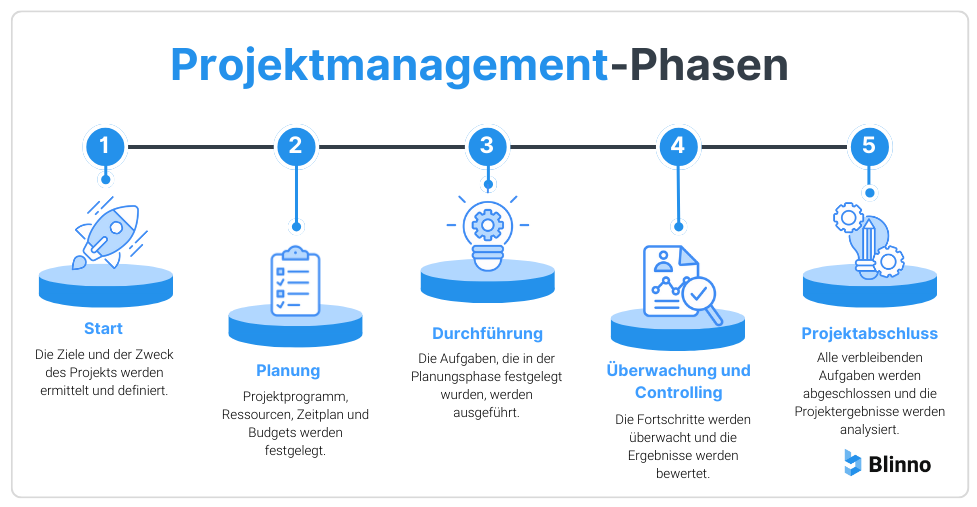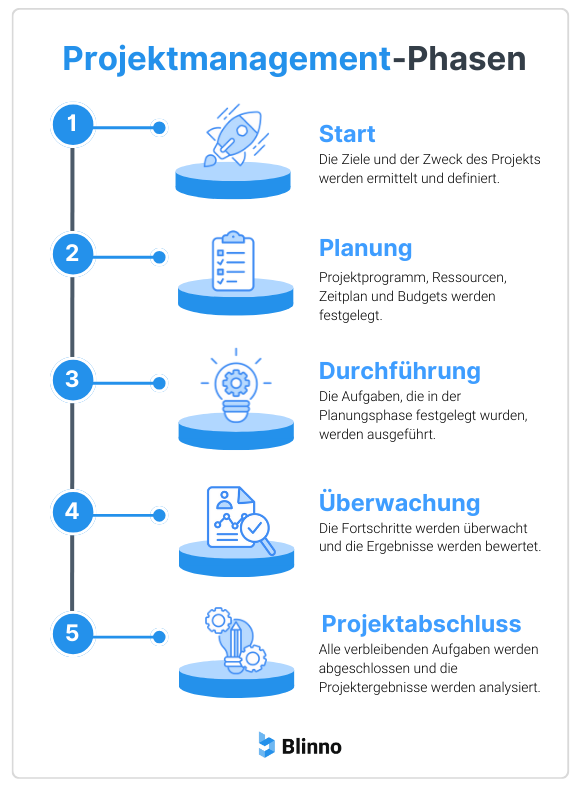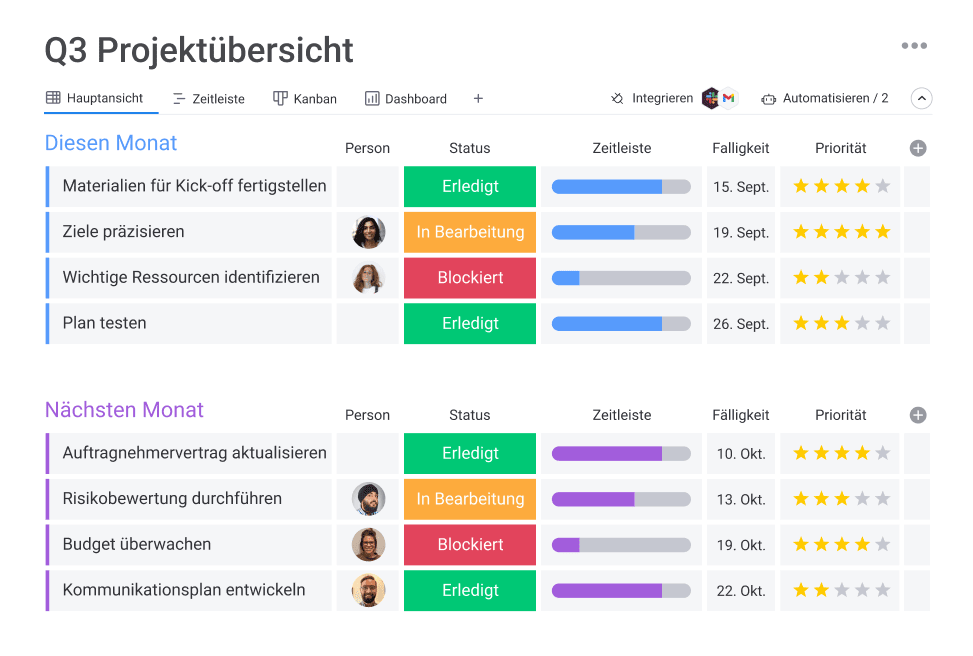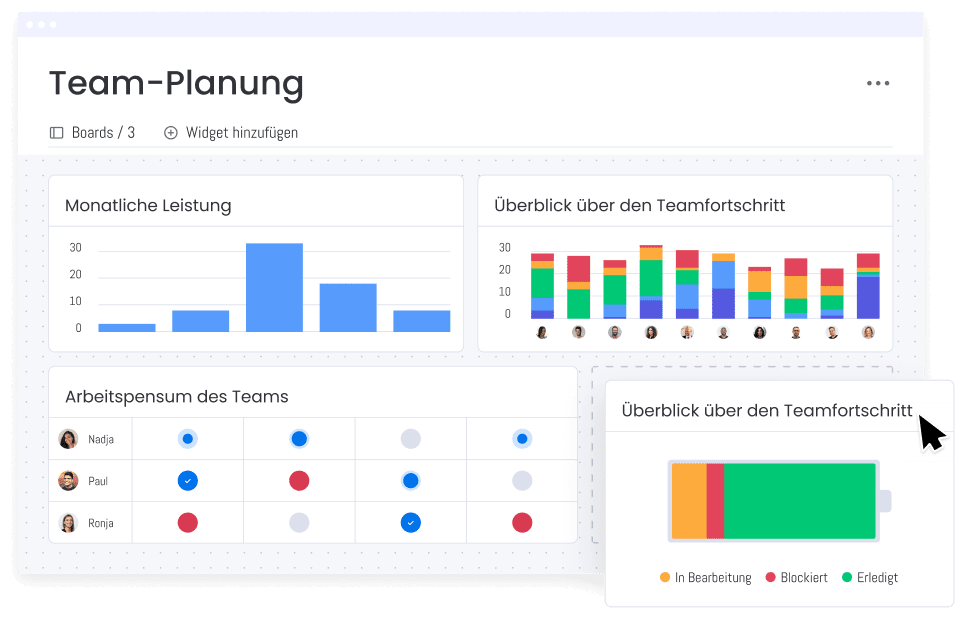Even if you’re not an experienced project manager, you’ve probably heard of the five phases of project management. These phases are crucial to the success of a project, as they provide the framework for planning, executing and monitoring a project. In this blog, we will take a closer look at these five phases and understand how they contribute to successfully completing projects.
What is the project life cycle?
The project life cycle, also known as the project life cycle model, is a concept that describes the different phases or stages that a project goes through throughout its existence. These phases are usually defined to structure and organize the planning, implementation and monitoring of a project. The project life cycle serves as a framework to ensure that the project is completed properly and that its objectives are achieved.


What are the 5 project phases?
We would like to take a look at the 5 phases of a project and the most important points in each phase:
Phase 1: Start (initiation)
The project is officially launched in this phase. This is where the project objectives are defined, the project brief is drawn up and the most important stakeholders are identified. The goal is to get a clear idea of what the project should achieve and whether it is viable.
Here are some reasons why the project start is so important:
Clarity about goals and expectations: At the start of the project, everyone involved should have a clear idea of the goals and expectations of the project. This helps to avoid misunderstandings and ensure that everyone involved in the project is working towards the same goal.
Definition of responsibilities: During the start of the project, the responsibilities for various tasks and task areas are defined. This helps to ensure that everyone in the team knows what tasks they have to complete and promotes collaboration.
Budget and time planning: The project start is the time when the budget and schedule are determined. It is important to make realistic estimates to ensure that the project can be completed within budget and on time.
Risk analysis: Potential risks are also identified and evaluated during the start of the project. This enables the team to develop risk mitigation plans and be prepared when unforeseen issues arise.

Source: monday.com
Phase 2: Planning
In this phase, detailed plans are drawn up that define the project process, resources, schedule and budgets. Tasks are distributed and milestones are set. The planning serves as the basis for the entire project implementation.. Here are some reasons why the planning phase is so crucial:
Definition of objectives and requirements: The project objectives and requirements are clearly defined during the planning phase. This is crucial to ensure that everyone involved has a common understanding of what the project is intended to achieve.
Resource planning: In this phase, the required resources, including personnel, budget and materials, are identified and planned. Efficient resource planning contributes to the smooth implementation of the project.
Scheduling: The planning phase also includes the creation of a detailed schedule. This schedule shows when certain tasks must be completed in order to achieve the project goals.
Risk assessment: Potential risks are analyzed and evaluated during the planning phase. This enables the project team to develop appropriate risk mitigation measures and be prepared if unforeseen issues arise.

Source: monday.com
Phase 3: Execution
This is where the actual implementation of the project takes place. The tasks defined in the planning phase are carried out, resources are allocated and team members work to achieve the project goals. This phase requires effective coordination and communication. Successful implementation in this phase is crucial for the success of the project for various reasons:
Realization of the objectives: During the implementation phase, the objectives of the project are put into practice. This is the moment when the desired result takes shape.
Resource management: It is important to manage resources effectively and ensure that they are used according to the plan. This includes personnel, budget and materials.
Scheduling: The previously created schedule is implemented during this phase. Adherence to the schedule is crucial to avoid delays.
Communication: Clear communication within the team and with stakeholders is particularly important in this phase to ensure that everyone is up to date and that problems are identified in good time.
Quality control: During the implementation phase, it is crucial to ensure that the work is carried out according to quality standards.

Source: monday.com
Phase 4: Monitoring and controlling
Progress is monitored and performance evaluated throughout the project. Deviations from the plan are identified, evaluated and corrective measures are taken to bring the project back on track. Communication with stakeholders and team members remains crucial in this phase. Here are some reasons why the monitoring phase is so important:
Progress monitoring: During the monitoring phase, you can track the progress of the project and ensure that all tasks and milestones are achieved according to the schedule.
Budget control: Monitoring allows you to keep an eye on the budget and ensure that resources are used efficiently.
Risk management: Potential risks can be identified and assessed in this phase. This puts you in a better position to take measures to minimize risks.
Quality control: The quality of the work can be checked and assured during the monitoring phase to ensure that it meets standards.

Source: monday.com
Phase 5: Project completion
Once all project objectives have been achieved and the results meet the requirements, the project is completed. The project closure phase is crucial to ensure that the project has achieved its objectives and is properly completed.
Here are some reasons why the project completion phase is so important:
Result evaluation: In this phase, the results and deliverables of the project are evaluated to ensure that they meet the requirements and quality standards.
Budget closure: The financial side of the project is checked to ensure that the budget has been adhered to and that there are no outstanding invoices or obligations.
Documentation and reporting: All relevant documents, reports and records should be collected and archived to create a clear project history.
Stakeholder satisfaction: Stakeholders’ opinions are collected to ensure that their expectations have been met and to gather any disagreements or feedback for future projects.

Source: monday.com
Why is it important to know the 5 phases of a project before you start?
It is extremely important to clearly define the five phases of a project before you start implementing it. This ensures that the project is well organized, efficiently handled and successfully completed. The reasons why this clear definition of the phases is so important are explained below:
1. Clear goals and expectations:
Define the phases of the project from the outset, set clear goals and expectations. This helps everyone involved, including the project team and stakeholders, to understand what is to be achieved and what results are expected.
2. Efficient use of resources:
A clear definition of the phases enables efficient allocation of resources such as time, money and manpower. You know exactly which resources are needed in each phase and can plan and manage them accordingly.
3. Better risk assessment:
If you clearly define the phases of a project, you can also better identify and assess risks. This allows you to plan and implement risk mitigation measures at every stage to minimize potential problems.
4. Improved communication:
A clear definition of the phases promotes better communication throughout the entire project team. Everyone knows which tasks need to be completed in which phase, and this facilitates collaboration and the exchange of information.
5. Measurement of progress:
With clear phases, you can better measure the progress of the project. You can easily see whether the project is meeting the planned schedule and milestones or whether there are any deviations. This enables timely adjustments and corrections to keep the project on track.
How can you manage your project better?
If you know every phase of your project, you can better manage your resources and time and achieve the goals you set yourself at the beginning of your project. However, it can be a challenge to manage your project and keep track of it. Deshalb gibt es verschiedene Plattformen, die dir helfen können, dein Projekt zu managen, eine davon ist monday.com.
monday.com is a popular project management and team collaboration platform that offers a wide range of tools and features to efficiently plan, execute and manage projects. This tool offers a comprehensive solution for project management that is suitable for teams of different sizes and industries. It enables efficient organization, planning and implementation of projects and facilitates collaboration and communication between team members and stakeholders.
monday.com offers a variety of templates for working with your team. From project overviews to Gantt charts to customized dashboards, you’ll find a variety of options to choose from to best suit your needs.
Want to know more about monday.com?
Try monday.com now for free or find out more about the advantages of project management with monday.com in our blog “Project management with monday.com – how to overcome every hurdle in everyday project work”.
Conclusion
In summary, it can be said that the clear definition of the five phases of a project creates a clear roadmap for the entire project process. This facilitates the planning, execution and monitoring of the project and increases the likelihood that it will be successfully completed. Such a structure creates transparency and understanding among all project participants and helps to ensure that resources are used efficiently and risks can be better controlled. It is therefore crucial to clearly define the phases of a project from the outset.







